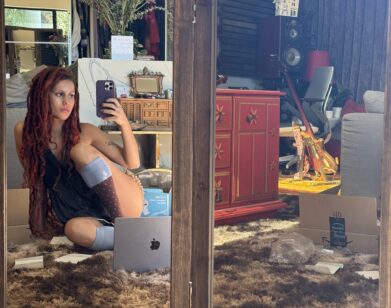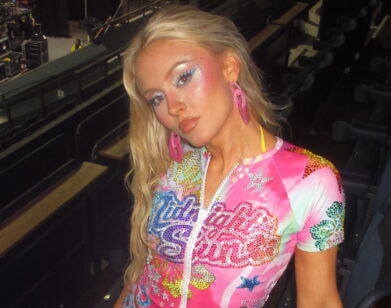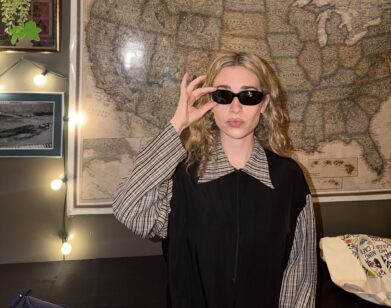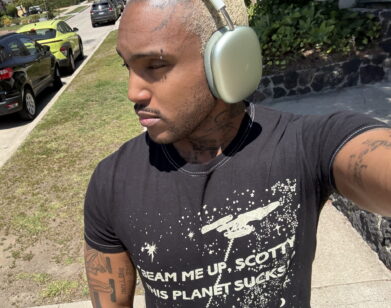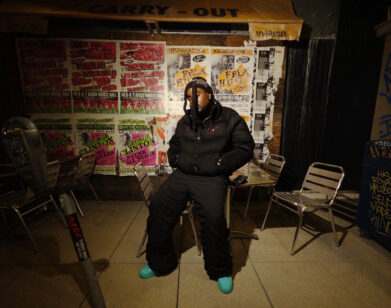Exclusive Mixtape Premiere and Interview: ‘Live Yourself,’ How to Dress Well
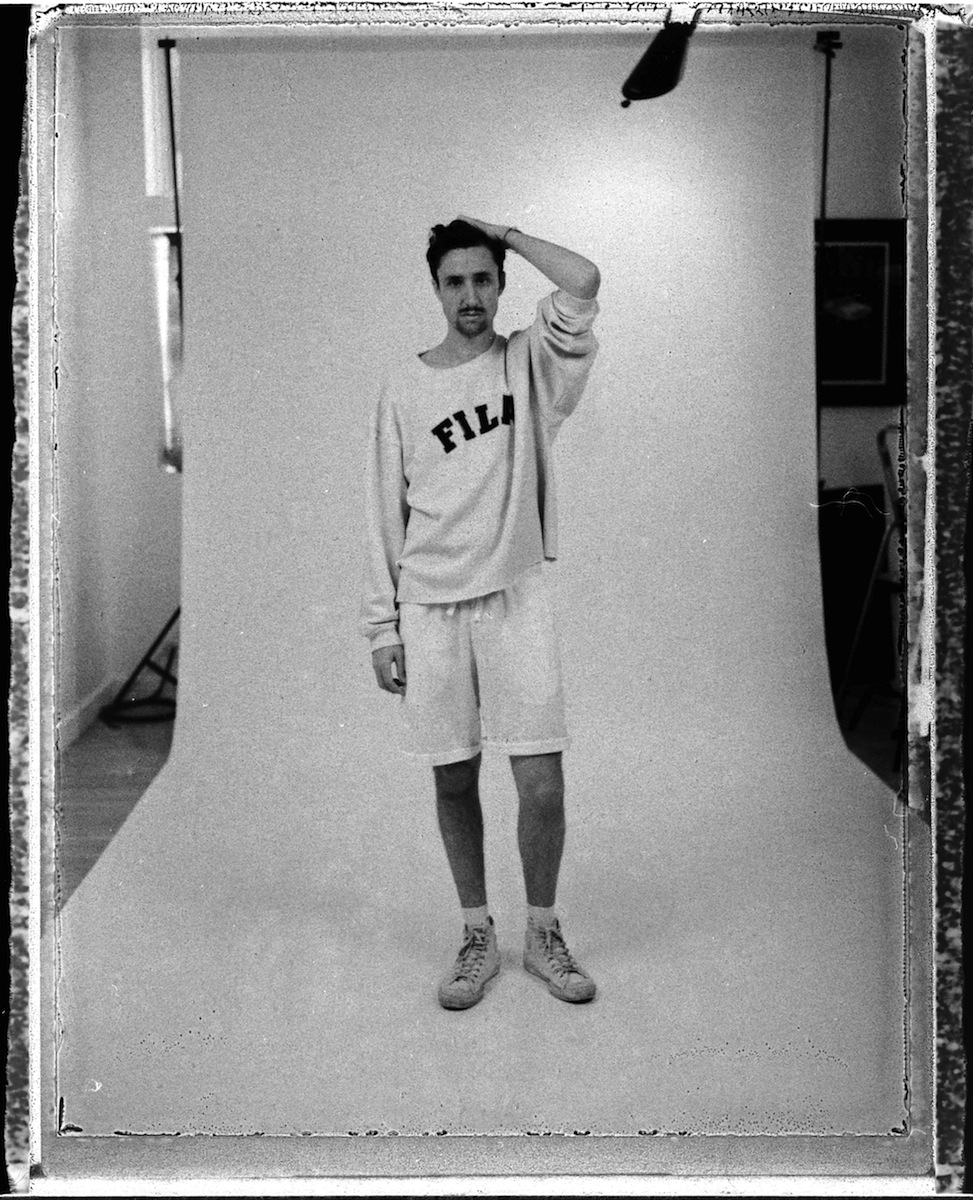
IMAGE COURTESY OF JESSE LIROLA
Interview met Tom Krell, who performs as How to Dress Well, last summer in Oslo, a few hours before his set at the Øya Festival. Despite having arrived in town earlier that day, he was perfectly turned out: pants cuffed just so, a stark white watch with no numerals.
Krell is concerned with presentation—but in an intellectual way that befits his advanced studies in philosophy, rather than a vain, purely performative one. He cares deeply about how listeners will receive his music, a fuzzy blend of R&B beats, piano loops, reverb, and Krell’s distinctive falsetto swimming, most often, somewhere in the background. He wants to connect.
And for the most part, he has: How to Dress Well’s debut EP, Love Remains, which came out in 2010 when “hipster R&B” was at its fever pitch, was critically beloved, and Krell’s upcoming album, Total Loss, due out in the fall, was announced two weeks ago and is one of this year’s most anticipated. We’re expecting it to be a lot like Krell himself: deeply considered, smart and complex, and full of unexpected references.
In advance of Total Loss, we’re thrilled to premiere a new How to Dress Well mixtape, Live Yourself, below. (A track list is available at the Soundcloud link.) Our interview with Krell follows.
ALEXANDRIA SYMONDS: Why did you decide to end Love Remains with “Suicide Dream 1”? You might disagree, but it seems like it leaves the album in a sort of liminal space—it’s a song that happens in between something and something else.
TOM KRELL: I like that. For me, that song, the way it’s kind of piano loop-based and the singing is pushing in a direction that’s not the same as the way I sing on “Can’t See My Own Face” or something, which is obviously a more R&B kind of thing. That song, to me, is my favorite song I’ve ever done. In my sets, too. To me, that song is very ambiguous song—because it’s really, really sad, but it also really captures a powerful image for me. I don’t know if you’ve listened to the orchestral version. I recorded it and then the next day started singing this additional verse, which isn’t on Love Remains. So the Love Remains version is not complete. That, and being a kind of liminal song on the album, it’s even more meta.
SYMONDS: Are you still in grad school?
KRELL: I’m moving through my Ph.D. work. I always have taken long, roundabout paths through things, so I’ve been a grad student for long enough—by years’ standards—I probably should be done. But I went slowly through my Master’s, and I had a year fellowship when, it should have been a post-doc fellowship, but it was between my Master’s and doctoral stuff. So I’m ahead of the game and behind the game. I’ve been in grad school a bunch of years. The coursework is almost done, now I just have to write the thing.
I don’t really like to talk about it that much. There are other artists out there that really like to bring philosophy and their theory into what they’re doing. But for me, if music were another way for me to do theory, I don’t know if I’d be in love with it. It’s definitely something different, separate. Not totally disconnected—I don’t think that it’s a complete disconnect between the fact that I want to do this hard thinking about something really esoteric on the one hand, and I want to make these really esoteric songs on the other hand.
SYMONDS: I think they’re pretty approachable.
KRELL: Yeah, and they’re going to get more approachable, too. Love Remains is just still me figuring out how to be doing what I think are advanced songs, but in an open way. And that album still comes from a position—I was feeling pretty alienated. When you’re feeling alienated—I didn’t want to push myself further into alienation—but you’re still in this bitter position, because you’ve been cast out and left alone. So the record has this push and pull: I’m trying to let people in, but with this resentment for being put out. But the record being recognized, and people liking the record, makes me way more ready to make something that’s actually open. Which is not to say simple; just different. I was really afraid to sing on the first record. And I want to sing more on my next record.
SYMONDS: One of my favorite lines on the album is, “Don’t forget to check your cell phone.” I’ve had that feeling—you don’t want to nag, but you don’t want to be disconnected from this person.
KRELL: I think that’s probably right, I’m into that. One of things music allows me to do that philosophy doesn’t is explore the ways in which the trite shit is hella true. My friend died, and all I could think to say for six months was the most trite bullshit. But it was these trite phrases that were tapping into the core of my missing him and pain and happiness at having known him. One of the reasons I don’t like to talk about philosophy and music in the same breath is that, for me at least, pop melody and pop song structures and stuff let me be trite and not feel like I’m not being articulate enough or not taking things seriously enough, like taking seriously the meaning of trite statements.
It’s hard to intellectualize one’s position, but most of the time I’m walking around like, “Ugh, I don’t know what I want, I don’t know what I need, who am I?” [laughs] And I’m not thinking like, “Oh, of course I’m always separated from myself because of the constitution of the human subject and the belatedness and the essential delay of generational transmission.” I’m like, “No, fuck, I’m horny, I’m lonely, ugh.” [laughs] I don’t know.
SYMONDS: Music can be a space to not be that smart, even if you are smart. That’s why I think people who are really intellectual when they write about music can kind of suck.
KRELL: Yeah for sure, especially when they’re writing about pop music. I’ve come to realize that most of my intellectual postures and a lot of my intellectualism is super defensive and really symptomatic of basic fears. My one thing with the record is that I wanted to make something alien that wasn’t alienating. And I think that the last thing I want is to dedicate my life to something which renders me further and further from being at home in my life—progressively more alienated and separate from myself.
SYMONDS: How has traveling been, for something who is very concerned with the state of being lonely?
KRELL: Traveling has been awesome. Traveling is amazing. You meet so many great, positive people. You get to see new faces all the time. I don’t think that loneliness, it’s not like you have no one in your life. Well, I’d say it’s like . . . you can have everyone you need in your life and still be lonely. Everyone knows that. Being on the road is complicated and shitty; it’s also really, really rad.
SYMONDS: Are you by yourself? Do you have a tour manager?
KRELL: I’m by myself right now. Usually my manager would come with me. This time I had this festival in Poland and a little UK tour with this artist Grimes. We’ve played before and we knew each other, so it wasn’t like I was out there totally alone. So no I’m here, and then I go to London to for three weeks to record.
SYMONDS: Do you feel comfortable talking about the new material?
KRELL: I do. I don’t know if my manager does—but he’s not here. I’m really excited about it. There’s a huge variety of songs: really epic, almost like Alice DJ-style pop; a lot of the songs are really slow burning, piano loop-driven kind of “Suicide Dream” style pieces. There’s a hymnal that I’ve written from my mother. It’s largely a capella.
SYMONDS: It’s like a sampler platter.
KRELL: Yeah, it is. The thing is like, Love Remains is also stylistically, from song to song, totally different. Something like “Walking This Dumb” and “Suicide Dream 2” on the same record: “Walking This Dumb” is this caustic take on a “you can’t tell me how to live” diva song. Then “Suicide Dream 2” is a really slow, slow-burning piano ballad. I think the variation is visible on Love Remains, too. Some people maybe didn’t have access to the EPs as I was releasing them, in the year before Love Remains came out, but there were 35 songs released. There’s a lot of songs that haven’t been put to wax that were heavy noise songs or really slow, vocal performance things.
That hymnal, “Friday Morning Hymnal,” is my attempt to express the some of the stuff we’ve been talking about, like the intellectual approach to things and musical approach to things. The lyrics are “Who could have known that there was silence / and we could have betrayed it with the sounds of the earth.” And I just sing that over and over. Hopefully, the point of the song is that the singing of the hymnal doesn’t betray the silence.
SYMONDS: I got you.
KRELL: Sweet. Right now I’m going to the studio with 18 potential songs, and I don’t know what will end up on the record. The majority are piano-driven, vocal-driven. I’ve written a duet with myself where I sing in two different registers.
SYMONDS: How do you feel about the R&B moniker? Do you think people make too much of it?
KRELL: Yes and no. As someone who listens almost exclusively to contemporary hip-hop and R&B, I definitely like “No Bullshit” by Chris Brown, and melodically I’m really into what he’s doing—that song is kind of singular because it’s got this piano intro and outro. But obviously I’m not singing about what he’s singing about. What we want out of our songs is not the same thing.
SYMONDS: Are you sure? You don’t know Chris Brown.
KRELL: I don’t know him that well. [laughs] I definitely think of myself as a singer, like an R&B, soulful singer. But you know, I think it’s cool, I should say. It’s weird to me, because me and my friends were listening to R&B all through the last eight years, and just in the last few years, when I’ve been putting my shit out, everyone I meet is a huge R&B fan. Which is great for the state of R&B, for the state of music. It’s having a moment, which is awesome.
SYMONDS: I don’t know how you feel about when people tell you what their record does for them—
KRELL: I’m really into that.
SYMONDS: When I was at the point where you’re conscious of forming memories, but not conscious enough to understand most of what’s happening around you, that was in the early ’90s. And that’s when a lot of that kind of R&B was super popular, that’s what you would hear on the radio.
KWELL: Yeah. One of the oldest posts on my blog is just this picture I found of Bobby Brown with the headline “I started remembering in 1989.” That’s a really weird thing, I remember when I started remembering.
SYMONDS: The earliest musical memories I have are hearing early ’90s R&B with no context of it whatsoever—being in my car with my parents, and not knowing how a radio works, but knowing Bobby Brown was on it. So there’s this hazy memory blend, and that’s what your music does for me.
KRELL: Yeah, that’s a huge part of what I’m doing. But I feel like that haziness is . . . I don’t think we really know what pop music is at all. Why it works so well. I think pop songs work on everyone all the time, how they work when you were five in your parents’ car. You don’t know what it is or how it got there, but you know it’s catchy and it’s in your head. When I try and sing songs, I just have these songs in my head and a lot of them are very late ’80s, early ’90s pop stylings. It goes even later than that—like, early aughts music is so weird to me. When it think about how I heard “Steal My Sunshine” by Len, it just made no sense to me what it was.
SYMONDS: It was a very strange time for music. There was that sunscreen song.
KRELL: Yeah, what was with that song?
SYMONDS: That was by Baz Luhrmann, the director. It was such a weird moment. It was on the radio constantly. And now he’s directing The Great Gatsby.
KRELL: I didn’t know what samples were. Samples are young as hell. But I remember, what did I think was going on in a song like that Primitive Radio Gods song? I just loved that song. It was all samples, at the chorus. There was like an elite group of producers then, who had a strangle hold on the means of production of pop songs. And that strange hold is dwindling. Now you have people like me making pop songs, and people all over the world making pop music independently. It seemed like pop music was so produced. You had to have a billion-dollar studio and crazy knowledge and layers and whatever, whatever to create pop music.
SYMONDS: Do you think it’s more of a meritocracy now?
KRELL: I’m not sure. I think the means of making pop music are being democratized. I think the Internet is a crucial part of that. The circulation of samples, trading samples has a huge effect on the way that kind of music gets made or produced.
[Krell plays some new demos and sings along]
SYMONDS: Thank you, that was very brave of you. I feel like it’s harder to sing to just one person than it is to sing to 400, although maybe I’m wrong.
KRELL: Well, it’s easier because I know you’re on board [than] when I’m singing to a huge crowd, when I’m singing to a bunch of people that know of me.
SYMONDS: Do you ever read the writing about you? A lot of places lump you in with the James: Jamie xx, James Woon, James Blake.
KRELL: I’ve only heard one Jamie xx song and I was really twisted at Sonar and Deadboy played it, and it was probably the best song I’ve ever heard in my entire life. But it was super-powerful electronic music. So I don’t think Jamie xx and I are making the same type of music.
SYMONDS: Have you heard the “PBR&B” appellation?
KRELL: Oh yeah, I have heard of this. But I don’t think that’s exactly right. There’s a lot to be said about that.
SYMONDS: It’s clever, but I don’t think it’s correct.
KRELL: It is. People are like “I love R&B, like The Weeknd!” That applies to people who are just not educated. But to me, PBR&B, I don’t think my music is particularly fun. It’s pretty painful-sounding, pretty strange. It has its fun moments, obviously.
SYMONDS: Do you think of PBR as the beer equivalent of fun?
KRELL: Well, it sounds to me like a party. Yeah, so like Frank Ocean a very talented R&B singer, but his influences are, you can tell he wants to be something halfway between Prince and Stevie Wonder. He’s just doing something. And The Weeknd guy just sings about abusing women and taking drugs. I think I’m doing something very different than either of those guys for certain. Those are your only R&B touchstones, if the three of us are your touchstones, then that’s cool, it’s a really good way to get into good music. I think it’s cool that I may have started a change.
TOTAL LOSS IS DUE OUT THIS FALL; HOW TO DRESS WELL WILL PLAY PUBLIC ASSEMBLY IN BROOKLYN ON JUNE 9. FOR MORE ON THE ARTIST, VISIT HIS WEBSITE.

